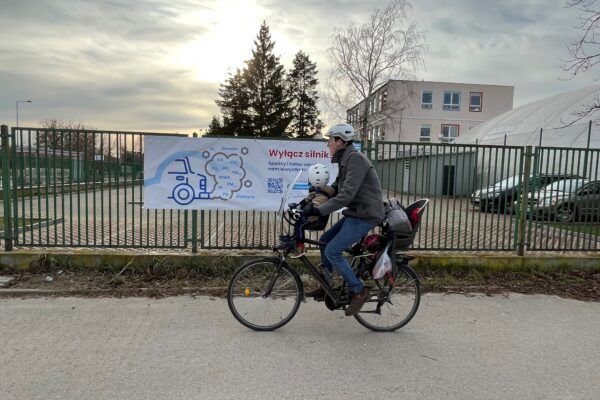Air pollution affects every one of us – globally and in Europe – with dire consequences. The state of the air we breathe is a health emergency. Hundreds of billions of euros are lost yearly due to the economic costs of air pollution. Bad air worsens climate and environmental catastrophes, and hits the most marginalised in society the hardest. The EU cannot afford to continue to pay for these unnecessary costs to our economies, societies and future.
Costs of poor air
In the EU, hundreds of thousands of lives are cut short each year due to air pollution – up to 655,000 premature deaths were attributed to air pollution in 2020. Poor air quality increases diseases, cognitive decline and damage to mental health. Air pollution leads to increased healthcare costs, productivity loss and lower GDP.
Air pollution is intertwined with environmental degradation and climate change. Air pollutants like methane, ozone and black carbon contribute greatly to global warming. Extreme temperatures brought by climate change create heatwaves and increasingly urban heat islands, which worsen air quality even more. Air pollutants also damage nature and crops: in 2019, just ozone emissions’ negative impact on wheat yields cost Europe €1,4 billion.
Polluting the air we breathe raises serious questions about social and inter-generational justice. The most vulnerable members of our societies, including children, people living in poverty and unborn babies suffer the most from the adverse effects of polluted air.
Urgent cross-sector challenges
Clean air is vital for people to live, grow work. But prominent sectors cross Europe continuously disregarded its importance. Our activities, including the production of energy, heat, industrial goods, food and transport, continue to contaminate the air we breathe:
- Agriculture: Ammonia emissions are mainly caused by livestock farming and the use of synthetic nitrogen ammoniacal fertilisers. Around 80% of ammonia emissions come from only 5% of farms in the EU.
- Industry and energy: In 2017, 2% of the largest industrial sites in Europe were responsible for half of the total damage from air pollution in Europe. These air pollutants are mostly emitted from Germany, Poland, Spain and Italy.
- Transport and mobility: The transport sector remains one of the only sectors of the EU economy where emissions are still above 1990 levels. In 2020, the largest proportion of greenhouse gas emissions from the transportation sector in the EU came from road transport, accounting for 77% of all emissions.
The benefits of cleaner air for public health, equitable societies and stronger economies are often ignored by policy and investment decision makers in Europe. The EU has set up its clean air agenda and the European Commission proposed a revised Ambient Air Quality Directive in 2022. However, EU’s existing and upcoming rules on air quality fall well short of current WHO guidance limits and are not comprehensive enough to ensure that emissions from all relevant sectors are properly addressed. Moreover, influential actors like healthcare practitioners, are not playing their role in educating people about the sources and impacts of air pollution.
Air quality standards are not implemented and enforced effectively. Citizen involvement and access to environmental justice is limited. While some cities and municipalities have made progress, their success varies and is far from the integrated approach the EU needs.
Integrated action for a sustainable and healthy Europe
As scientific evidence on the impact of air pollution on human life continues to grow, we can no longer accept it as an inevitable by-product of our economies and activities. The EU is keen to boost its competitiveness, promote well-being across the continent, and minimise its climate and environmental footprint.
The increasing relevance and transformative potential of cleaner air in these efforts cannot be ignored. The co-benefits between clean air and economic development, social justice, public health, climate action and environmental protection must be acknowledged.
The EU must not be complacent and take integrated action. Considerations around clean air should be at the core of its decision-making. To this end, the EU needs:
1. A compelling vision and framework for action:
- Adopt an ambitious and comprehensive clean air agenda for the EU, including robust air quality targets under the Ambient Air Quality Directive, currently under revision;
- Make cleaner air an integral part of the EU’s vision and framework for greater wellbeing;
- Better enforcement of the air quality standards and the ‘polluter pays’ principle;
- Better monitoring, including in the areas currently not properly covered;
- Raise awareness about the causes of air pollution, benefits of action and measures to be taken.
2. Concrete measures to address air pollution:
- Ensure that clean air objectives are adequately recognised and implemented as a part of industrial, mobility, energy, climate, agriculture and health policies;
- Encourage, empower and enable regional, local and citizen action.
Effective leadership is vital in recognizing and communicating the benefits of cleaner air. We can no longer afford to bear the unnecessary costs of air pollution. Our leaders must demonstrate unwavering political will in pushing for a stronger clean air agenda.
Note: This text is based on the Discussion Paper ‘Towards a cleaner air in Europe: Time for a stronger vision and more action’ published on 6 July as part of the project ‘Cleaner air: Time to capture the benefits’ implemented by the European Policy Centre and supported by the Clean Air Fund.

